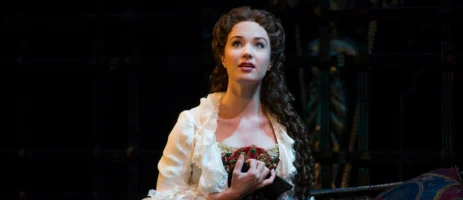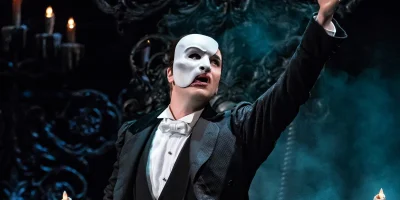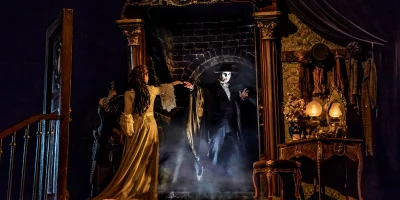
The Phantom of the Opera
Join me for a little jaunt down memory lane to a magical place that is alive and well. Andrew Lloyd Webber's THE PHANTOM OF THE OPERA, directed by theatre legend Harold Prince and produced by Cameron Mackintosh and The Really Useful Group, is the longest-running show in Broadway history. A recent revisit to this lavish production got me to thinking about what it takes to make a show age so beautifully.
Well, you start with a story that reeks of sexuality, mystery, innocence and passion. Then you add music that weaves motif after motif together in a manner that even a tone deaf person could grasp. Add impeccable design - 19th century costumes and a set that is so enormous it dwarfs the cast and so spectacular that you can hardly keep track of where you are. Top it off with staging that is actor proof and voila!
When I say actor-proof, I don't mean that this cast is in any way deficient. Indeed, each is an impeccable performer. The three principals have spectacular voices that span several octaves, and each knows exactly how to deliver the goods. Julia Urdine as Christine is no shrinking violet. She is a young woman who opens her heart and her voice to whatever adventure the world offers, including the power and dark magic of the Phantom. Jeremy Hays (Raoul) has the difficult job of playing second romantic fiddle to the Phantom, and he manoeuvers up that river without flagging for an instant. James Barbour (the 15th Phantom on Broadway) is menacing and vulnerable, and his passion takes up the entire stage whenever he is on it. Watching him in person one realizes that singing with a mask and several layers of latex on your face is no easy feat. Barbour, however makes it look so.
The Phantom of the Opera, based on the classic novel by Gaston Leroux, is the story of a man who was born with a horribly deformed face. He hides in the bowels of a Paris opera house where he toys with and torments the occupants just because he can. When he hears Christine Daaé sing, however, his heart bursts open and he dedicates himself to nurturing her talent. Soon the Phantom is overtaken by his own passion for Christine as a woman and a singer, and he becomes reckless. He shows her his lair in the river below the city. He reveals his love for her. She responds in kind, until she sees his face. Still, their connection remains inviolable, even when Christine tumbles for Raoul. The Phantom makes demands on her behalf and declares war on the opera house when his demands are not met. Everything comes to a head, with Raoul becoming the pawn. The lovers are allowed to live and the Phantom - well, who knows what happened to him?
This story has it all: music that stays with you long after the curtain comes down (yes I bought the CD), love in an array of colors, fantasy, danger, sex, hopes and dreams. The Phantom of the Opera remains a stunning production that engages the ear, the eye and the heart. The fact that it has done so for nearly 30 years world wide is testament to the crafty craft of making theatre. Theatre is ultimately a magic show, and one of the reasons being human is such a gas.
Got a friend coming into town? Take her to see this one. You won't be disappointed one little bit. And when you buy the music I won't say, "I told you so." Promise.
(Photo by Matthew Murphy)
"It may be possible to have a terrible time at The Phantom of the Opera, but you'll have to work at it. Only a terminal prig would let the avalanche of pre-opening publicity poison his enjoyment of this show, which usually wants nothing more than to shower the audience with fantasy and fun, and which often succeeds, at any price. The physical production, Andrew Bridge's velvety lighting included, is a tour de force throughout—as extravagant of imagination as of budget."
Frank Rich for New York Times
"It is a spectacular entertainment, visually the most impressive of the British musicals. Perhaps the most old-fashioned thing about it is it's a love story, something Broadway has not seen for quite a while. To say the score is Lloyd Webber's best is not saying a great deal. His music always has a synthetic, borrowed quality to it. As you listen you find yourself wondering where you've heard it before. In this case you've heard a lot of it in Puccini, in the work of other Broadway composers and even the Beatles. Nevertheless he seems to be borrowing from better sources, and he has much greater sophistication about putting it all together. There are some droll opera parodies, several beautiful songs, an impressive septet and a grand choral number, all richly orchestrated."
Howard Kissel for New York Daily News
"Technically it is a piece of impeccably crafted musical theater, with theme, music and staging in perfect accord. They combine as a total statement that depends for its potency more on the sum of its parts than on the strength of any individual component."
Clive Barnes for New York Post
"The London audiences aren't wrong. "The Phantom Of The Opera" is romantic musical theater hokum in the grand manner - hokum cordon blue - and it justifies the feverish buildup that has given it a $16,500,000 advance. It's good for a Broadway run of several years. Andrew Lloyd Webber has taken the Gaston Leroux potboiler about the love-crazed disfigured genius who lives in the catacombs of the Paris Opera and fashioned it into a thrilling and musically rich mass legit entertainment. The 19th century period spectacle, scenic legerdemain, soaring melodies and exceptional singing are at the service of an involving and piquantly offbeat love story, all of it staged with brilliantly organized flair by Harold Prince, back in top form."
Richard Hummler for Variety
External links to full reviews from popular press...
Originally published on


